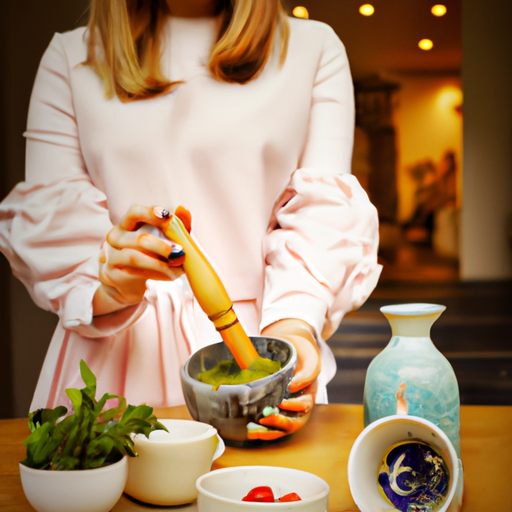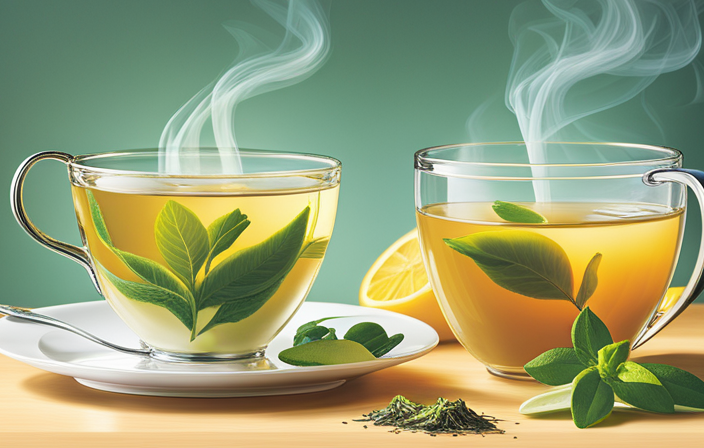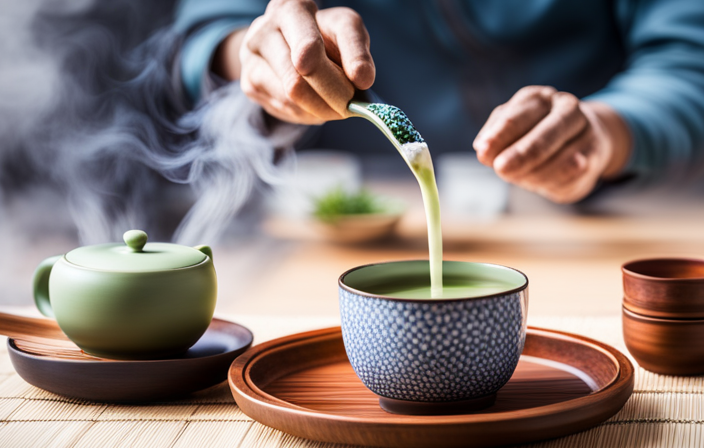Turmeric Tea
How To Put Turmeric In Tea

Are you looking to add a new twist to your tea routine? Look no further than turmeric! This vibrant yellow spice has been used for centuries in traditional medicine, and recent research has shown that it may have many health benefits. Adding turmeric to your tea not only provides a unique flavor, but it may also help boost your immune system, reduce inflammation, and improve digestion.
But how exactly do you incorporate turmeric into your tea? Don’t worry, it’s easier than you may think. With a few simple tips and tricks, you can create a delicious and healthy cup of turmeric tea in no time.
In this article, we’ll cover the health benefits of turmeric, the types of tea that pair well with it, how to choose the right turmeric, and step-by-step instructions for preparing three different turmeric tea recipes.
So, grab your favorite mug and let’s get started!
Key Takeaways
- Fresh turmeric root should be ground into a fine powder for the best results.
- Black pepper should be added to increase the absorption of curcumin.
- Turmeric pairs well with a variety of teas, including green, ginger, chai, black, and herbal teas.
- Turmeric tea can be customized with different sweeteners and spices, such as cloves or nutmeg, for added flavor.
Health Benefits of Turmeric
You’ll be amazed at the health benefits you can get from adding turmeric to your tea! This spice has been used for centuries in traditional medicine to treat a range of ailments. Today, modern research has shown that turmeric contains compounds with powerful anti-inflammatory and antioxidant properties, making it a valuable addition to your diet.
Turmeric supplements are a popular way to get your daily dose of this potent spice, but adding it to your tea can be just as effective. In fact, cooking with turmeric has been shown to increase its bioavailability, meaning your body can absorb more of its beneficial compounds.
So, whether you’re looking to support your immune system, reduce inflammation, or simply add a delicious twist to your tea, turmeric is definitely worth considering.
Now that you know all the amazing health benefits of turmeric, let’s talk about which types of tea pair well with this spice.
Types of Tea that Pair Well with Turmeric
If you’re a fan of bold and spicy flavors, incorporating turmeric into your favorite teas might just be your next favorite thing. Turmeric tea has been known to offer many health benefits, including reducing inflammation, improving digestion, and boosting the immune system.
However, not all teas are created equal when it comes to pairing with turmeric. Here are some types of tea that pair well with turmeric:
- Green tea: The subtle bitterness of green tea compliments the earthy taste of turmeric, making for a refreshing and healthy beverage.
- Ginger tea: Ginger and turmeric are both anti-inflammatory powerhouses, making this combination a great choice for those looking to soothe sore muscles or joints.
- Chai tea: Spices such as cinnamon, cardamom, and cloves in chai tea blend well with turmeric, creating a warm and cozy flavor.
- Black tea: The boldness of black tea can balance out the slightly bitter taste of turmeric, resulting in a robust and flavorful cup of tea.
- Herbal tea: Turmeric pairs well with most herbal teas, such as chamomile, peppermint, or rooibos, for a soothing and caffeine-free option.
Choosing the right turmeric is important to ensure maximum flavor and health benefits in your tea. Let’s take a closer look at how to select the best turmeric for your tea.
Choosing the Right Turmeric
Finding the perfect turmeric to spice up your cuppa can be a game-changer, enhancing the flavor and boosting your health one sip at a time. When it comes to choosing the right turmeric for tea, it’s essential to consider the sourcing and cultivation practices.
You want to ensure that the turmeric you use is of high quality, free of contaminants, and grown using sustainable methods. When sourcing turmeric, look for organic and non-GMO varieties. This ensures that the turmeric is free of harmful pesticides and genetically modified organisms.
Additionally, consider the source of the turmeric. Turmeric from India is often considered the best due to the country’s long history of cultivating the spice. However, turmeric from other regions, such as Hawaii and Fiji, can also be excellent options.
Once you’ve sourced your turmeric, it’s time to prepare it for tea.
Preparing Turmeric for Tea
Get ready to unleash the vibrant and zesty flavors of turmeric as you infuse it into your steaming cup of tea like a mad scientist concocting the perfect elixir. Before you can start brewing your turmeric tea, you need to prepare the turmeric first.
The best way to do this is by grinding fresh turmeric root into a fine powder using a mortar and pestle or a spice grinder. This will help release the full flavor and aroma of the turmeric, making for a more enjoyable tea drinking experience.
Once you have ground your turmeric, it’s time to infuse it into your tea. Simply add a teaspoon of the turmeric powder to your tea pot or cup, along with your favorite tea leaves or tea bags. Pour hot water over the mixture and let it steep for at least 5 minutes to allow the flavors to fully develop.
After steeping, strain the tea and enjoy the warm and invigorating flavors of turmeric and your chosen tea. Now that you know how to prepare the turmeric for your tea, it’s time to enhance the flavor by adding ingredients such as honey, lemon, or ginger. These ingredients not only add a delicious taste but also provide additional health benefits to your tea.
Adding Flavor to Turmeric Tea
Transform your cup of warm, golden liquid into a burst of tantalizing flavors by incorporating spice combinations and sweeteners into your turmeric tea recipe. For a spicy kick, add in a slice of fresh ginger or a pinch of cayenne pepper. If you prefer a sweeter taste, drizzle in some honey or maple syrup. You can also add a splash of milk or coconut milk for a creamy texture.
Experiment with different flavor combinations until you find the perfect mix for your taste buds. Keep in mind that some sweeteners may overpower the natural flavor of the turmeric, while others may complement it. Once you’ve found your ideal spice and sweetener combination, you can move on to the basic turmeric tea recipe, which we’ll discuss in the next section.
Basic Turmeric Tea Recipe
To make a delicious cup of this healthy beverage, all you need is water, milk, honey, and a pinch of black pepper, which increases the absorption of curcumin (the active ingredient in turmeric) by 2000%.
Boil one cup of water and add half a teaspoon of turmeric powder. Reduce heat and let it simmer for around 10 minutes. Afterward, strain the mixture and add one cup of milk, along with honey to taste. Finally, sprinkle a pinch of black pepper on top.
You can also add other ingredients like ginger, cinnamon, or lemon to switch things up and create different variations of turmeric tea. Drinking turmeric tea has many benefits, but the best time to drink it is in the morning or before bedtime.
It can help improve digestion, boost the immune system, and reduce inflammation. Drinking it before bedtime can also help you relax and improve the quality of your sleep. Now that you’ve learned how to make basic turmeric tea, let’s move on to the next section and learn how to make turmeric milk tea, a creamy and delicious twist on this healthy drink.
Turmeric Milk Tea Recipe
Are you ready to try a creamy and delicious twist on your turmeric tea? This turmeric milk tea recipe is the perfect way to add some variety to your daily cup. Not only is it a tasty treat, but it also has numerous health benefits!
To make this spiced and creamy tea, start by heating up 1 cup of milk (dairy or vegan alternative) with 1 teaspoon of grated fresh ginger and 1 teaspoon of ground turmeric. Once it starts to simmer, add a pinch of cinnamon and black pepper, which’ll help the body absorb the turmeric’s active ingredient, curcumin. Let it simmer for 5 minutes and then strain it into a cup.
You can sweeten it with honey or maple syrup to taste. This recipe is perfect for those who want to add a little extra creaminess to their turmeric tea while also indulging in some spiced variations.
Looking for a refreshing summer drink? Keep reading to learn how to make an iced turmeric tea recipe that’s perfect for hot days.
Iced Turmeric Tea Recipe
If you’re looking for a way to beat the heat, this iced turmeric tea recipe is the perfect solution – it’s so refreshing, you’ll feel like you’re sipping on a tall glass of liquid gold!
To make this refreshing drink, start by brewing a pot of your favorite tea, such as green or black tea. Once the tea is brewed, add a teaspoon of ground turmeric and stir until it’s fully combined.
Next, add a splash of lemon juice and a drizzle of honey for a sweet and tangy flavor. If you want to add a bit of spice, you can also add a pinch of cinnamon or ginger.
Pour the mixture into a glass filled with ice and enjoy! There are many variations of iced turmeric tea that you can try, such as adding fresh mint leaves or swapping out the lemon juice for lime.
You can also turn this refreshing drink into a turmeric tea cocktail by adding a shot of vodka or gin. Just be sure to enjoy responsibly!
Now that you’ve mastered the art of making iced turmeric tea, let’s move on to the next recipe – a delicious turmeric chai tea recipe that’s perfect for the cooler months.
Turmeric Chai Tea Recipe
If you enjoyed the refreshing taste of iced turmeric tea, you may want to try a warm and cozy version with a bit of a spicy kick. Turmeric chai tea is a delicious and healthy alternative to your usual cup of tea. This recipe combines the antioxidant-rich turmeric with a blend of warming spices that will not only provide a comforting flavor but also a range of health benefits.
To make turmeric chai tea, you’ll need to start with a base of black tea. Then, add in some freshly grated ginger, cinnamon, cardamom, and of course, turmeric. Once you have brewed your tea, you can add your choice of sweetener and milk for a creamy texture. Spice variations are also possible, such as adding cloves or nutmeg, depending on your taste preferences.
For serving suggestions, you can enjoy your turmeric chai tea with a slice of lemon or a dollop of honey. As you sip on your spicy and soothing turmeric chai tea, keep in mind that this beverage is not only delicious but also packed with numerous health benefits.
Turmeric is known for its anti-inflammatory and antioxidant properties, while cinnamon and ginger can help with digestion and blood sugar regulation. So, sit back, relax, and enjoy this warm and comforting cup of turmeric chai tea.
Plus, stay tuned for our next section on tips and tricks for perfect turmeric tea.
Tips and Tricks for Perfect Turmeric Tea
Get ready to perfect your cup of turmeric tea with these tips and tricks that’ll have you enjoying the full benefits of this delicious and healthy beverage. Turmeric tea benefits are numerous, including reducing inflammation, boosting the immune system, and aiding in digestion.
To fully experience these benefits, it’s important to brew your tea properly. When it comes to brewing techniques, the key is to use high-quality ingredients and the right amount of turmeric. For a single cup of turmeric tea, use 1 teaspoon of freshly grated or ground turmeric. You can also add other spices such as ginger, cinnamon, or black pepper for additional flavor and health benefits.
To brew, bring water to a boil and then let it cool for a minute before pouring it over the turmeric and any other ingredients. Allow the tea to steep for 5-10 minutes and then strain before enjoying.
With these tips, you’ll be able to brew the perfect cup of turmeric tea every time.
Frequently Asked Questions
Is it safe to consume turmeric every day?
Oh, of course, it’s perfectly safe to consume turmeric every day! In fact, the benefits of daily turmeric consumption are numerous, from reducing inflammation to improving brain function. Turmeric tea recipes for different health concerns are also widely available.
Can turmeric interact with any medications I am taking?
Be cautious when taking turmeric with medications, as it may interact with blood thinners, diabetes drugs, and more. Consult a healthcare provider before taking turmeric supplements. Recommended dose is up to 500mg per day.
How much turmeric should I use in my tea?
You can’t go wrong with turmeric tea! Sprinkle a generous pinch of turmeric in your tea. Experiment with variations like adding ginger or honey. Sip it during a relaxing evening to reap the benefits.
Can I use powdered turmeric instead of fresh turmeric?
Yes, you can use powdered turmeric instead of fresh turmeric in your tea. The powdered form is more convenient and has a longer shelf life. Additionally, you can also incorporate turmeric into other drinks for added health benefits. However, fresh turmeric may have a stronger taste and aroma.
How long can I store leftover turmeric tea in the fridge?
Congratulations on making turmeric tea! Store leftover tea in the fridge for up to three days. Turmeric’s anti-inflammatory and antioxidant properties can boost your immune system and reduce inflammation. Enjoy the benefits of turmeric in tea today!
Conclusion
Congratulations! You now know how to make the perfect cup of turmeric tea!
With all the health benefits that turmeric offers, it’s no wonder that this spice has become a popular addition to tea. You learned about the different types of tea that pair well with turmeric and how to choose the right turmeric for your tea.
You also learned how to prepare turmeric for tea and how to add flavor to turmeric tea. One important thing to keep in mind when making turmeric tea is to not overdo it. As the old saying goes, "a little goes a long way."
Turmeric has a strong flavor and can easily overpower the taste of your tea if you use too much. So, be sure to use the recommended measurements and adjust to your liking.
Incorporating turmeric into your tea routine can be a great way to reap its health benefits while enjoying a warm and comforting beverage. So, go ahead and give it a try! Remember, practice makes perfect, and with a bit of trial and error, you’ll soon be sipping on the perfect cup of turmeric tea.
Turmeric Tea
When Making Turmeric Tea Do You Have To Drink The Turmeric

I adore sipping on a warm cup of tea, especially when it brings along some extra health perks. **Turmeric tea** has been making waves lately as a go-to choice. Turmeric, a spice often seen in Indian and Middle Eastern cooking, is famous for its bright yellow hue and unique taste. Aside from spicing up meals, turmeric is believed to have advantageous effects like fighting inflammation and boosting brainpower. If you’re curious about trying something new that’s good for you, turmeric tea might just be the perfect pick!
If you’re considering trying out turmeric tea, you may be wondering if you need to actually consume the turmeric root in order to reap the benefits. After all, some people prefer not to consume bits of plant matter or may find the taste too strong.
In this article, we’ll explore whether it’s necessary to drink the turmeric and how much you should consume for optimal health benefits. We’ll also share tips for making the perfect cup of turmeric tea and discuss alternative ways to incorporate this spice into your diet.
Key Takeaways
- Consuming turmeric particles in tea may provide maximum health benefits.
- Some people prefer not to consume bits of plant matter in their tea.
- Turmeric supplements contain higher doses of curcumin than food sources.
- Adding black pepper to turmeric tea can increase curcumin absorption by up to 2,000%.
The Health Benefits of Turmeric
You’ll be happy to know that drinking turmeric tea can provide you with a multitude of health benefits, including reducing inflammation and boosting your immune system. Turmeric contains a compound called curcumin, which has powerful anti-inflammatory properties. This means that consuming turmeric regularly may help reduce chronic inflammation in the body, which is linked to many diseases such as heart disease, cancer and Alzheimer’s.
In addition to its anti-inflammatory effects, research has shown that curcumin may also have anti-cancer properties. Studies have found that it can inhibit the growth of cancer cells and even induce apoptosis (programmed cell death) in some types of cancer cells. While more research is needed on this topic, incorporating turmeric supplements or drinking turmeric tea regularly may be a simple way to potentially reduce your risk of developing certain cancers.
Now that we know about the health benefits of turmeric, let’s dive into how to make turmeric tea at home.
How to Make Turmeric Tea
To brew this golden elixir, simply infuse hot water with the warm spice and savor its aromatic essence. Start by boiling water in a pot and adding turmeric powder or grated fresh turmeric root. Allow it to simmer for about 5-10 minutes while stirring occasionally until the color turns a deep gold.
You can adjust the amount of turmeric according to your preference, but a good rule of thumb is one teaspoon per cup of water. Possible variations include adding ginger, cinnamon, honey, lemon juice, or black pepper to enhance the flavor and health benefits of your tea.
Ginger complements turmeric’s anti-inflammatory properties while cinnamon adds sweetness without sugar. Honey is a natural sweetener that also has antibacterial properties while lemon juice provides vitamin C and enhances digestion. Black pepper contains piperine which boosts curcumin absorption by up to 2000%, making it more bioavailable in your body.
Experiment with different combinations until you find your perfect blend. Speaking of absorbing curcumin, some people wonder if it’s necessary to drink the actual turmeric particles in their tea or strain them out before drinking. This will be discussed in the next section so keep reading!
To Drink or Not to Drink the Turmeric
When deciding whether or not to consume the turmeric particles in your brewed beverage, imagine sipping on a rich, golden liquid with speckles of spice floating throughout. It’s important to note that drinking turmeric is safe and even beneficial for most people. However, some may find the taste overwhelming or unpleasant.
Here are some factors to consider when deciding whether or not to drink the turmeric in your tea:
-
Taste preference: If you enjoy the earthy flavor of turmeric and don’t mind a little grittiness in your tea, go ahead and drink it up!
-
Health benefits: Turmeric has numerous health benefits, including anti-inflammatory properties and potential cancer-fighting abilities. If you’re brewing turmeric tea specifically for its health benefits, it may be worth consuming the particles for maximum effect.
-
Digestive issues: Some individuals may experience digestive discomfort when consuming large amounts of turmeric particles. If this applies to you, it may be best to strain out the particles before drinking.
Now that we’ve discussed whether or not to drink the turmeric in your tea, let’s move on to how much you should consume for optimal health benefits.
How Much Turmeric Should You Consume?
Consuming the right amount of turmeric can provide numerous health benefits, but it’s important to know how much to add to your daily routine. While there is no one-size-fits-all answer when it comes to turmeric dosage, studies suggest that consuming 500-2,000mg of curcumin (the active ingredient in turmeric) per day may have therapeutic effects. However, some experts recommend starting with a lower dose and gradually increasing over time.
If you’re not a fan of adding turmeric to your meals or beverages, you can also consider taking turmeric supplements. These supplements typically contain higher doses of curcumin than what you would find in food sources. As with any supplement, be sure to consult with your healthcare provider before adding it to your routine as they can interact with certain medications or conditions.
When it comes to making the perfect cup of turmeric tea, there are several tips and tricks that can help enhance the flavor and maximize its potential health benefits.
Tips for Making the Perfect Cup of Turmeric Tea
You might be surprised to learn that adding black pepper to your turmeric tea can increase the absorption of curcumin by up to 2,000%! This powerful combination is just one of many ways to make the perfect cup of turmeric tea.
Here are three tips for making a delicious and healthy brew:
- Experiment with different variations of turmeric tea – from creamy golden milk to spicy chai blends.
- Add some ginger for an extra boost of anti-inflammatory properties and flavor.
- Don’t forget to sweeten your tea with honey or maple syrup if needed.
Apart from tasting great, turmeric tea has numerous health benefits such as reducing inflammation, improving heart health, and boosting brain function. Adding ginger only amplifies these effects, making it a potent combination that anyone can benefit from incorporating into their daily routine.
As much as I love drinking my turmeric tea, there are other alternative ways to consume this superfood that you might want to explore next!
Alternative Ways to Consume Turmeric
If you’re looking for a new and exciting way to add some spice to your diet, consider incorporating turmeric into your meals.
While making turmeric tea is a popular option, there are alternative ways to consume this powerful spice. One such option is taking turmeric supplements, which can provide all of the health benefits without having to worry about consuming large amounts of turmeric in food.
Another way to incorporate turmeric into your diet is by trying out some delicious recipes that feature this flavorful spice. From curries and stews to smoothies and golden milk lattes, there are countless options for adding turmeric to your meals in creative and tasty ways.
Just be sure to follow recipes carefully and avoid consuming too much turmeric at once, as excessive consumption can lead to certain risks and side effects.
Risks and Side Effects of Consuming Turmeric
As someone who frequently consumes turmeric, it’s important to be aware of its potential risks and side effects.
Some common concerns include interactions with medications, allergic reactions, and other potential side effects such as stomach upset or diarrhea.
While turmeric has many health benefits, it’s important to understand these risks before incorporating it into your diet or supplement regimen.
Interactions with Medications
Be cautious of potential interactions between turmeric and any medications you’re currently taking. Turmeric may interact with certain medications, such as blood thinners, diabetes drugs, and stomach acid reducers. These interactions can increase the risk of side effects or reduce the effectiveness of the medication.
It’s important to consult with your healthcare provider before using turmeric if you’re taking any medications. Your doctor can advise you on appropriate dosage recommendations or suggest alternative treatments that don’t interact with your medication.
By being proactive about drug interactions, you can avoid potentially harmful effects and ensure that your treatment plan is safe and effective.
Moving forward, let’s now discuss another important consideration when using turmeric – allergic reactions.
Allergic Reactions
Watch out for potential allergic reactions to turmeric, which can range from mild symptoms like itching and hives to more severe reactions such as anaphylaxis, likened to a bee sting causing swelling in the throat and difficulty breathing. It’s important to note that individuals who are allergic to ginger or yellow food dyes may also be at risk of cross-reactivity with turmeric. If you experience any adverse effects after consuming turmeric tea, seek medical attention immediately.
If you suspect that you may have an allergy to turmeric, there are various testing options available. Skin prick tests and blood tests can help determine whether an individual has developed an allergic reaction to the spice. However, it’s important to consult with your healthcare provider before undergoing any testing procedures.
Additionally, if you’re diagnosed with a turmeric allergy, it’s essential to avoid all products containing the spice.
Moving forward into the subsequent section about "other potential side effects,"it’s important to recognize that while allergies may be a concern for some individuals when consuming turmeric tea, other potential side effects such as gastrointestinal discomfort and interactions with certain medications should also be taken into consideration.
Other Potential Side Effects
It’s important to be aware of potential complications when incorporating turmeric into your diet. While turmeric is generally considered safe, some people may experience gastrointestinal discomfort such as bloating or diarrhea. It’s also possible for turmeric to interact with certain medications, including blood thinners and diabetes drugs, so it’s important to check with your healthcare provider before adding it to your regimen.
When consuming turmeric, it’s recommended to follow dosage guidelines and not exceed the recommended amount. Generally, up to 1 teaspoon per day is considered safe for most adults. If you have any concerns about taking turmeric or are experiencing adverse effects after consumption, it’s best to consult with a healthcare professional.
With these precautions in mind, incorporating turmeric into your diet can be a beneficial addition for its anti-inflammatory properties and other health benefits.
As we consider how to incorporate turmeric into our diets safely and effectively, it’s also important to know how best to store this potent spice.
How to Store Turmeric
If you’re not planning on consuming turmeric right away, storing it in an airtight container in a cool and dark place is key to preserving its freshness. Here are three tips for storing your turmeric:
-
Keep it dry: Moisture can cause turmeric to spoil quickly, so make sure the container and the storage area are both dry before placing the spice inside.
-
Avoid sunlight: Direct sunlight can also cause turmeric to lose its potency, so store it in a dark place like a cupboard or pantry.
-
Use glass containers: Plastic containers can absorb flavors and odors from other foods stored nearby, which can affect the taste of your turmeric. Glass jars with tight-fitting lids are ideal for keeping your spices fresh.
By following these simple steps, you’ll be able to keep your turmeric fresh for longer periods of time, ensuring that you always have flavorful and potent spice on hand whenever you need it.
So go ahead and stock up on this versatile spice – just remember to store it properly!
Frequently Asked Questions
Are there any alternative ways to prepare turmeric tea other than the method mentioned in the article?
I’ve found a few Turmeric tea alternatives that I enjoy. One variation is adding ginger for a spicier taste, or cinnamon and honey for a sweeter flavor. Experimenting with different ingredients can create new and delicious flavors.
Can turmeric tea be consumed by pregnant women?
As a healthcare professional, I advise pregnant women to exercise caution when consuming turmeric tea due to its potential effects on pregnancy and breastfeeding. Consultation with a doctor is recommended before consumption.
How long does it take to see the health benefits of consuming turmeric?
I have found that the health benefits of consuming turmeric vary depending on the individual’s consumption frequency, dosage, and preparation methods. It may take several weeks to see significant effects, but pregnant women should consult a healthcare provider before use. Time of day and taste preferences can also impact turmeric intake. There are various recipes available for incorporating turmeric into one’s diet.
Is it safe to consume turmeric tea every day?
Is it safe to consume turmeric tea every day? Yes, as long as you don’t exceed the recommended dosage. The benefits of turmeric tea include reducing inflammation, improving brain function and lowering the risk of heart disease.
What is the best time of the day to drink turmeric tea?
The best time to drink turmeric tea is in the morning or before bedtime. Benefits and dosage vary based on your needs, but adding ginger and honey to turmeric tea recipes can enhance its health benefits.
Conclusion
And there you have it, folks! Turmeric tea is a delicious and healthy beverage that can provide numerous benefits for your body.
Whether you choose to drink the turmeric or strain it out, this golden spice can help with inflammation, digestion, and even boost your mood.
Remember to start with a small amount of turmeric and gradually increase as needed. And don’t be afraid to experiment with different flavors and add-ins to make the perfect cup of turmeric tea.
So why not give it a try today? Your taste buds and your body will thank you for it!
Turmeric Tea
Turmeric Tea Erectile Dysfunction How Long

Having personally experienced erectile dysfunction (ED) in the past, I understand the frustration and loneliness it can bring. Although there are various pharmaceutical treatments for ED, some individuals may opt to try natural remedies first. Turmeric tea has become a popular choice in recent years.
Turmeric has been used for centuries in traditional medicine to treat a variety of ailments, including sexual dysfunction. But does it actually work? In this article, we will take a closer look at the science behind turmeric’s potential benefits for sexual health and explore how long it may take to see results from drinking turmeric tea.
We’ll also discuss dosing recommendations, potential side effects and precautions, and other natural remedies that may help improve ED symptoms.
Key Takeaways
- Turmeric contains curcumin, which has anti-inflammatory properties that can benefit the cardiovascular system by improving blood flow and increasing nitric oxide production, potentially improving symptoms of Erectile Dysfunction (ED).
- L-arginine, an amino acid that increases nitric oxide production, may also help improve ED symptoms.
- Consuming turmeric with black pepper or healthy fats such as coconut oil or olive oil can increase its bioavailability and maximize its effects.
- While natural remedies like turmeric tea offer a safe and non-invasive alternative to prescription medications for ED, persistent symptoms may require medical attention, and it is important to consult with a doctor before starting any new supplement regimen.
Overview of Erectile Dysfunction (ED) and Its Causes
If you’re struggling with ED, it’s important to understand the underlying causes so you can take control of your sexual health and regain confidence in the bedroom. While there are many factors that can contribute to ED, some of the most common include age, diabetes, heart disease, high blood pressure, smoking, and certain medications.
Additionally, psychological causes such as stress, anxiety, and depression can also play a significant role in causing or exacerbating symptoms. Fortunately, there are several preventative measures that men can take to reduce their risk of developing ED.
These include maintaining a healthy weight through diet and exercise, quitting smoking if you currently smoke, limiting alcohol consumption, managing stress levels through relaxation techniques like meditation or yoga, and seeking treatment for any underlying medical conditions that may be contributing to symptoms. By taking these steps early on and addressing any potential psychological causes of ED through counseling or therapy if necessary, men can often improve their sexual health and overall quality of life significantly.
With this understanding in mind, let’s explore how turmeric works to improve sexual health.
How Turmeric Works to Improve Sexual Health
By improving blood flow and reducing inflammation, turmeric can enhance sexual function and satisfaction. Turmeric contains a compound called curcumin, which has been found to have anti-inflammatory properties that can benefit the cardiovascular system by improving blood flow. In addition, curcumin has been found to increase nitric oxide production in the body. Nitric oxide is a molecule that helps relax blood vessels and improve circulation, which can help with erectile dysfunction.
Here is a table outlining some of the benefits of turmeric beyond sexual health as well as some beginner-friendly turmeric tea recipes:
| Benefit of Turmeric | Beginner-Friendly Turmeric Tea Recipes |
|---|---|
| Anti-inflammatory properties | Classic Turmeric Tea |
| Antioxidant effects | Golden Milk Latte |
| Digestive aid | Ginger-Turmeric Tea |
| Brain-boosting properties | Turmeric Chai Tea |
| May reduce risk of chronic diseases | Iced Turmeric Lemonade |
Understanding the bioavailability of turmeric is important for maximizing its benefits.
Understanding the Bioavailability of Turmeric
To fully reap the benefits of turmeric, you may want to consider consuming it alongside other ingredients that can increase its bioavailability. This is because turmeric has low bioavailability on its own due to poor absorption mechanisms in the body. When consumed alone, much of the active ingredient in turmeric, curcumin, is metabolized before it can be absorbed into the bloodstream.
Fortunately, there are several ways to increase the bioavailability of turmeric. One way is to consume it with black pepper, which contains piperine that enhances curcumin absorption by up to 2,000%. Another way is to consume turmeric with healthy fats such as coconut oil or olive oil since curcumin is fat-soluble and can be better absorbed when consumed with fats. Additionally, heat and cooking can also improve curcumin’s bioavailability.
By incorporating these methods into your consumption of turmeric tea for erectile dysfunction or other health conditions, you may see improved results from this powerful ingredient.
As we’ve discussed how to improve the bioavailability of turmeric for maximum effectiveness against erectile dysfunction or other health issues through consuming it alongside different ingredients, let’s now move on to dosage recommendations for optimal results.
Dosage Recommendations for Turmeric Tea
Maximize the health benefits of turmeric tea by following these recommended dosages that will make you feel revitalized and energized. According to research, consuming up to 400-600mg of curcumin per day is safe and effective in improving overall health. However, it is important to note that the bioavailability of curcumin can be increased when combined with certain ingredients such as black pepper or healthy fats.
To help you understand the appropriate dosage for your turmeric tea recipe, refer to this table below:
| Ingredient | Amount |
|---|---|
| Turmeric powder | 1 teaspoon |
| Black pepper | A pinch |
| Ginger root (optional) | ½ inch slice |
| Honey (optional) | 1 tablespoon |
By incorporating these ingredients into your daily routine, you can reap the numerous health benefits of turmeric tea while also enjoying its delicious taste. In addition to reducing inflammation and promoting heart health, turmeric has been shown to improve brain function and even potentially reduce the risk of cancer.
As we have learned about the recommended dosages for turmeric tea recipes, let’s now explore factors affecting the onset of effects.
Factors Affecting the Onset of Effects
Speed up the time it takes for you to feel the benefits of turmeric tea by understanding the various factors that can affect its onset. One of the most significant factors affecting absorption is how you brew your tea. It’s essential to give turmeric enough time to steep in hot water, and a good rule of thumb is to let it sit for at least 10 minutes before consuming it.
This allows more curcumin, which is the active compound in turmeric responsible for its health benefits, to be extracted from the root and into your cup. Another factor that affects the onset of effects is whether or not you consume turmeric with other foods or supplements.
Eating a high-fat meal along with your tea may enhance absorption since curcumin is fat-soluble. However, consuming other supplements such as black pepper extract or ginger may also improve absorption rates since they contain compounds that can help increase bioavailability.
By taking these factors into account when brewing and consuming your turmeric tea, you may experience faster onset times and more potent effects overall. As with any supplement or herbal remedy, it’s crucial to be aware of potential side effects and precautions as well.
Potential Side Effects and Precautions
Uh-oh! It’s important to be aware of the potential side effects and precautions when taking turmeric tea for erectile dysfunction. While this powerful supplement has been shown to improve blood flow and reduce inflammation, there are some risks associated with its use.
Here are some things to keep in mind before trying turmeric tea:
- Turmeric can interact with certain medications, including blood thinners and diabetes drugs.
- High doses of turmeric may cause stomach upset and diarrhea.
- Some people may be allergic to turmeric, causing skin rash or breathing difficulties.
To minimize the risk of side effects, it’s important to talk to your doctor before starting any new supplement regimen. They can help you determine if turmeric tea is right for you based on your medical history and current medications.
If you decide not to try turmeric tea, there are other natural remedies for ED that may be worth exploring.
Other Natural Remedies for ED
Now that we’ve discussed the potential side effects and precautions of consuming turmeric tea for erectile dysfunction, let’s explore other natural remedies that may help improve ED.
Along with turmeric, there are several other natural supplements that have been studied for their potential benefits in treating ED. One such supplement is L-arginine, an amino acid that increases nitric oxide production in the body, leading to improved blood flow and potentially better erections.
Additionally, lifestyle changes such as regular exercise, a healthy diet, stress reduction techniques like meditation or yoga, and quitting smoking may also improve symptoms of ED. While these remedies may not work for everyone, they offer a safe and non-invasive alternative to prescription medications.
As with any health issue, if you’re experiencing persistent symptoms of ED despite trying natural remedies, or if your symptoms are accompanied by other concerning symptoms such as pain or bleeding during intercourse, it’s important to seek medical attention from a healthcare provider trained in sexual health.
When to Seek Medical Attention for ED
If you’re experiencing persistent symptoms of ED and they’re not improving with natural remedies, it’s important to seek medical attention from a healthcare provider who specializes in sexual health. While ED is a common condition among men, it can also be a sign of an underlying health issue that requires treatment. Here are some warning signs to look out for:
- Difficulty achieving or maintaining an erection
- Decreased sex drive
- Premature ejaculation or delayed ejaculation
- Painful erections
If you experience any of these symptoms, don’t hesitate to talk to your healthcare provider. They may recommend treatments such as medication, therapy, or lifestyle changes to improve your sexual function. In addition to seeking medical attention, there are also self-care tips you can follow to manage ED:
| Self-care tips | Benefits |
|---|---|
| Exercise regularly | Improves blood flow and overall health |
| Maintain a healthy diet | Promotes heart health and reduces inflammation |
| Manage stress | Reduces anxiety and improves overall well-being |
By taking care of yourself both physically and mentally, you may be able to improve your ED symptoms and prevent future issues. Remember that seeking help for ED is nothing to be ashamed of – it’s a common condition that many men experience at some point in their lives.
Frequently Asked Questions
What is the history of turmeric and its use in traditional medicine for sexual health?
Turmeric has a rich history in traditional medicine for improving sexual health. Its benefits go beyond treating erectile dysfunction and include improving overall reproductive function. Evidence supports its use as a natural remedy for various sexual health issues.
Can turmeric tea be combined with other natural remedies for ED for better results?
Combining turmeric tea with other natural remedies for ED can be effective or risky depending on the specific remedies and individual responses. Turmeric tea’s impact on overall sexual health supports a holistic approach to managing ED.
Are there any specific brands of turmeric tea that are recommended for treating ED?
I have found that there are several recommended brands of turmeric tea for treating erectile dysfunction when combined with natural remedies and lifestyle changes. These include Yogi, Traditional Medicinals, and Buddha Teas, all of which offer high-quality ingredients and potential benefits for ED.
How long does it typically take to see improvements in sexual function after drinking turmeric tea?
Turmeric Tea and Sexual Function: Timing and Expectations. The Science Behind Turmeric’s Impact on ED suggests that regular consumption of turmeric tea may improve sexual function in men, but individual results can vary. It may take several weeks or months to see significant changes.
Are there any specific lifestyle changes or habits that can enhance the effects of turmeric tea for ED?
To enhance the effects of turmeric tea for ED, adopting healthy habits and taking the daily dosage is important. Combining it with exercise and mindfulness can provide a holistic approach to managing ED with turmeric tea.
Conclusion
In conclusion, turmeric tea can be a natural and effective remedy for erectile dysfunction. Its anti-inflammatory and antioxidant properties help improve blood flow to the genital area, leading to better sexual health. However, it’s important to understand the bioavailability of turmeric and consider factors such as dosage and potential side effects before consuming it.
As the saying goes, "An ounce of prevention is worth a pound of cure."Incorporating natural remedies like turmeric tea into one’s lifestyle can potentially prevent or alleviate erectile dysfunction. However, if symptoms persist or worsen, it’s important to seek medical attention from a healthcare professional.
Overall, taking control of one’s sexual health through holistic approaches can lead to improved quality of life.
Turmeric Tea
What Does Ginger Turmeric Tea Taste Like
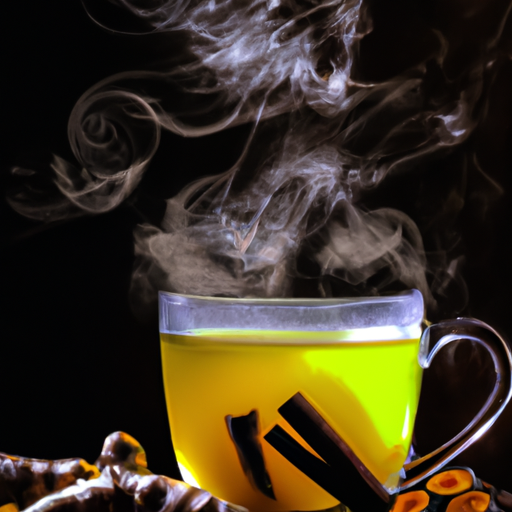
As a tea enthusiast, I am constantly searching for new and interesting flavors to experiment with. I recently discovered ginger turmeric tea and was immediately captivated by its bright color and distinctive blend of ingredients.
But before giving it a try, I couldn’t help but wonder: what does ginger turmeric tea actually taste like?
After doing some research and trying it myself, I can confidently say that ginger turmeric tea is unlike any other tea I’ve had before. Its rich earthy flavor, combined with the warming qualities of ginger and the slightly sweet and spicy notes, create a truly invigorating experience.
Whether you’re looking for a comforting drink on a chilly day or simply want to explore new flavors, ginger turmeric tea is definitely worth a try.
Key Takeaways
- Ginger turmeric tea has a spicy and earthy flavor profile with warm and slightly sweet notes from the ginger root and pungent, bitter undertones from the turmeric root.
- The tea has anti-inflammatory properties and can boost immunity, aid digestion, provide natural pain relief, and offer calming effects that ease the mind and body.
- Adding honey or lemon juice can sweeten the tea and provide additional health benefits, and different brewing styles can affect the taste and health benefits of the tea.
- Ginger turmeric tea is a versatile beverage that can be enjoyed hot or cold, used as an ingredient in various recipes, and is perfect for tea lovers who prefer subtle flavors and want to support overall health.
Brief Overview of Ginger and Turmeric Roots
You’ll be fascinated to learn that ginger and turmeric roots, when brewed together in a tea, produce a complex yet soothing flavor profile that’s both spicy and earthy.
Ginger root has a warm and slightly sweet taste that’s often used to add flavor to dishes, while turmeric root is more pungent and bitter with an earthy undertone. When combined, the two roots create a harmonious blend that’s not only delicious but also offers numerous health benefits.
Ginger and turmeric have been used for centuries in traditional medicine to treat ailments such as inflammation, nausea, headaches, and digestive issues. In addition to their medicinal properties, they’re also popular ingredients in various recipes from around the world.
From Indian curries to Thai soups, these roots add depth of flavor and complexity to any dish or beverage. And speaking of beverages – let me tell you about how easy it is to prepare ginger turmeric tea!
The Preparation of Ginger Turmeric Tea
After steeping the herbs in hot water for a few minutes, the warm and comforting aroma of the tea fills your kitchen and you can’t help but feel excited to taste it. Ginger turmeric tea has a unique taste that is both spicy and earthy. Here’s what you can expect when you take your first sip:
-
The initial flavor is slightly sweet, with hints of citrus from the ginger.
-
This sweetness is quickly balanced out by the spice of the ginger and turmeric, which gives a slight warming sensation in your mouth.
-
As you continue to drink, you’ll notice a subtle bitterness that adds depth to the flavor profile.
-
The finish is clean, with a refreshing aftertaste.
Different brewing styles can affect the taste of ginger turmeric tea. For example, if brewed for too long or at too high of a temperature, it can become bitter and overpowering. To avoid this, it’s recommended to steep for 3-5 minutes at around 200°F (93°C). With these guidelines in mind, you’re sure to enjoy all the delicious flavors this tea has to offer.
As I mentioned earlier, ginger turmeric tea has an earthy flavor that sets it apart from other teas.
In the next section, we’ll explore this unique taste more closely by examining its individual ingredients.
Earthy Flavor of Ginger Turmeric Tea
Get ready to experience a distinct and natural flavor that’s unique to ginger turmeric tea. The earthy taste of this tea comes from the combination of two powerful roots – ginger and turmeric. The blend creates a warm, spicy, and slightly bitter flavor that can be both soothing and invigorating.
But that’s not the only benefit of drinking ginger turmeric tea. Both ingredients have been used for centuries in traditional medicine for their anti-inflammatory properties and their ability to boost immunity. Brewing techniques can also play a role in how the tea tastes and its health benefits.
Adding honey or lemon juice can sweeten it up while providing additional health benefits such as antioxidants and vitamin C. Overall, ginger turmeric tea provides a delicious way to support your overall health while enjoying a tasty beverage.
This drink has warming and invigorating qualities that make it perfect for cold winter nights or early mornings when you need an extra kickstart. So if you’re looking for something with an earthy flavor that’s good for you too, give ginger turmeric tea a try!
The Warming and Invigorating Qualities
Experience the cozy warmth and energizing effects of this delightful tea blend with its invigorating qualities that will leave you feeling refreshed and rejuvenated. The combination of warming spices such as ginger and turmeric creates a soothing sensation that is perfect for those chilly days or when your body needs a little pick-me-up. Not only does it taste delicious, but it also boasts numerous health benefits due to the potent anti-inflammatory properties of these ingredients.
To truly understand the power of this tea, take a look at the table below which highlights some of the key benefits that come with drinking ginger turmeric tea:
| Benefit | Description |
|---|---|
| Anti-Inflammatory | Helps reduce inflammation in joints and muscles |
| Digestive Aid | Aids in digestion by promoting healthy gut bacteria |
| Immune Booster | Boosts immune system due to high levels of antioxidants |
| Pain Relief | Natural pain relief for headaches and menstrual cramps |
As you can see, there is much more to this tea than just its delicious flavor. So why not give it a try and experience all the warming qualities and health benefits for yourself? One sip and you’ll be hooked on the slightly sweet and spicy taste from ginger!
The Slightly Sweet and Spicy Taste from Ginger
Indulge in the delightful warmth and invigorating flavors of this tea blend, with a slight sweetness and spicy kick from the ginger that’ll leave your taste buds yearning for more.
The sensory experience of sipping on ginger turmeric tea is truly unique. Here are some culinary uses of ginger turmeric tea that’ll make you want to try it right away:
-
Imagine savoring a cup of hot ginger turmeric tea on a chilly winter morning, feeling its warmth spread throughout your body and soothing your senses.
-
Picture yourself enjoying a refreshing glass of iced ginger turmeric tea on a hot summer day, feeling the coolness wash over you as you take in its fiery spice.
-
Think about using ginger turmeric tea as an ingredient in your favorite recipes, adding layers of flavor to dishes like stir-fries, soups, and even baked goods.
The slightly sweet and spicy taste from ginger makes this tea blend versatile enough to use in various ways. As you sip on the comforting goodness of this beverage, don’t forget to notice the subtle bitterness and aroma of turmeric that follows.
The Subtle Bitterness and Aroma of Turmeric
As you take a sip of this golden elixir, the earthy aroma and gentle bitterness of turmeric transports you to a serene, sunlit garden. Turmeric is known for its incredible health benefits, including being anti-inflammatory and antioxidant-rich. This spice provides the perfect balance of bitterness that complements the sweetness from ginger.
The subtle taste of turmeric in this tea is what makes it unique and enjoyable. It creates a warm sensation in your mouth as you drink it, making it perfect for cooler days or when feeling under the weather.
As someone who enjoys herbal teas, I find that ginger turmeric tea is one of my favorites due to its delicious flavor profile and health benefits. But how does this compare to chai tea?
Comparison to Chai Tea
If you’re looking for a more complex and spicy flavor, chai tea may be the perfect choice for you. While ginger turmeric tea has its own unique taste, it cannot compete with the rich blend of spices found in chai. The aroma of cardamom, cinnamon, cloves, and ginger combine to create a warm and comforting scent that fills your senses with every sip.
Compared to black tea used in chai, ginger turmeric tea is milder in taste but still packs a punch with its earthy undertones. The combination of ginger and turmeric results in a slightly sweet and tangy flavor that is perfect for those who prefer subtle flavors. However, if you’re someone who enjoys bold flavors that awaken your senses, then chai tea may be more suitable for you.
When it comes down to it though, both teas have their own benefits and unique qualities. Speaking of which, let’s delve into the soothing and comforting qualities of ginger turmeric tea next.
Soothing and Comforting Qualities
Relax and let the warmth of a cozy blanket wrap around you like a comforting hug as you savor the soothing qualities of this golden elixir. Ginger turmeric tea isn’t just delicious, but it also offers calming effects that can ease your mind and body.
The combination of ginger and turmeric creates a warm, earthy flavor with subtle hints of spice. It’s perfect for those looking to unwind after a long day or those who want to start their morning on the right foot.
Aside from its taste, ginger turmeric tea also provides digestive benefits due to its anti-inflammatory properties. These two ingredients work together to help relieve bloating, stomach pain, and indigestion. When consumed regularly, it can even promote healthy gut bacteria and aid in weight loss.
So not only does this tea taste great, but it also has numerous health benefits that make it worth incorporating into your daily routine.
If you’re looking for ways to enhance the flavor of this already amazing drink, there are many options available! Adding honey or lemon can give it a sweet or tangy twist, while black pepper can increase the bioavailability of curcumin (the active ingredient in turmeric). Get creative with different herbs and spices to find what suits your taste buds best.
Ways to Enhance the Flavor
As I’ve mentioned earlier, one of the best things about ginger turmeric tea is its soothing and comforting qualities. However, some people may find the taste of this tea too strong or overwhelming. That’s where tips and variations can come in handy to enhance the flavor and make it more enjoyable.
One way to improve the taste of ginger turmeric tea is by adding natural sweeteners like honey or maple syrup. These ingredients not only add sweetness but also complement the earthy flavors of ginger and turmeric. Another option is to incorporate citrus fruits like lemon or orange, which provide a refreshing twist while balancing out any bitterness in the tea.
Tips for enhancing the flavor:
- Add natural sweeteners like honey or maple syrup
- Incorporate citrus fruits like lemon or orange
Variations to try:
- Mix with green tea for added health benefits
- Add fresh mint leaves for a cooling effect
By using these tips and variations, you can customize your ginger turmeric tea to your liking and enjoy all its health benefits without compromising on taste. Speaking of health benefits…
Health Benefits of Ginger Turmeric Tea
Get ready to experience the amazing health benefits of this powerful tea blend. Ginger turmeric tea is a natural remedy that can help improve your overall well-being and leave you feeling revitalized and energized.
Its combination of ginger and turmeric provides numerous health benefits, making it one of the best teas to add to your daily routine. Ginger turmeric tea has anti-inflammatory properties which can relieve pain, reduce inflammation, and boost immunity. It also aids in digestion by reducing bloating, gas, and nausea.
This tea is also known for its ability to detoxify the liver and promote healthy skin. To enjoy these health benefits, it’s recommended to drink 1-2 cups of ginger turmeric tea per day. So why not incorporate this delicious tea into your daily routine today?
Frequently Asked Questions
What are the origins of ginger and turmeric roots?
I find the historical and cultural significance of ginger and turmeric roots fascinating. Both have been used for thousands of years in traditional medicine and cooking, with origins in Asia. Their use continues today, especially in popular drinks like ginger turmeric tea.
Is ginger turmeric tea a good substitute for coffee?
I find ginger turmeric tea to be a great substitute for coffee thanks to its health benefits. It’s easy to prepare by boiling water, adding grated ginger and turmeric, then letting it steep. The flavor is spicy and earthy with a hint of sweetness.
How does the taste of ginger turmeric tea change when honey is added?
Adding honey to ginger turmeric tea enhances its flavor profile by adding a natural sweetness and a hint of floral aroma. Honey benefits include soothing sore throats and boosting immunity. Other uses for honey include as a natural sweetener in baking. Serving suggestions are with lemon slices or as an iced beverage on hot days.
Can ginger turmeric tea help with digestion?
I’m no expert, but I’ve heard that ginger turmeric tea can aid digestion. Its benefits are said to come from the anti-inflammatory properties of the ingredients. To prepare, boil water with grated ginger and turmeric powder.
Are there any potential side effects of consuming ginger turmeric tea?
I’ve found that while ginger turmeric tea has many health benefits, there are potential side effects to consider. These can include upset stomach and interactions with medication. It’s important to consult with a doctor before consuming regularly.
Conclusion
Overall, I find ginger turmeric tea to be a delicious and comforting beverage that’s perfect for any time of the day. The earthy flavor of the ginger and turmeric roots creates a warm and soothing sensation in my mouth, while the slightly sweet and spicy taste from the ginger adds a nice kick.
I also love how this tea compares to chai tea, with its warming and invigorating qualities. But what really sets ginger turmeric tea apart is its ability to soothe and comfort me on even the most stressful days. Whether I’m feeling under the weather or just need a moment of relaxation, a cup of this tea always does the trick.
So if you haven’t tried it yet, I highly recommend giving it a shot – who knows, it might just become your new go-to drink! And if you’re looking for ways to enhance the flavor even further, try adding some honey or lemon juice for an extra boost of sweetness or tanginess. Trust me – your taste buds will thank you later!
So next time you’re in need of something warm, flavorful, and healthy all at once, give ginger turmeric tea a try. Who knows – it might just become your new obsession! So why not add this delightful beverage into your morning routine?
-

 Turmeric Tea3 months ago
Turmeric Tea3 months agoWhat Teas Are High In Oxalates
-

 Turmeric Tea3 months ago
Turmeric Tea3 months agoWhat Teas Are Low In Oxalates
-
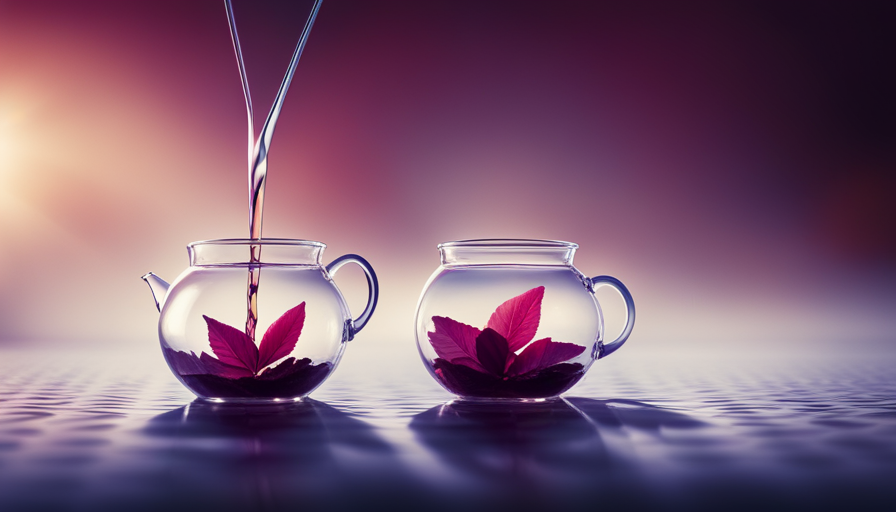
 Turmeric Tea3 months ago
Turmeric Tea3 months agoWhat Teas Have No Tannins
-

 Turmeric Tea3 weeks ago
Turmeric Tea3 weeks agoHow To Make Turmeric Tea With Powder
-
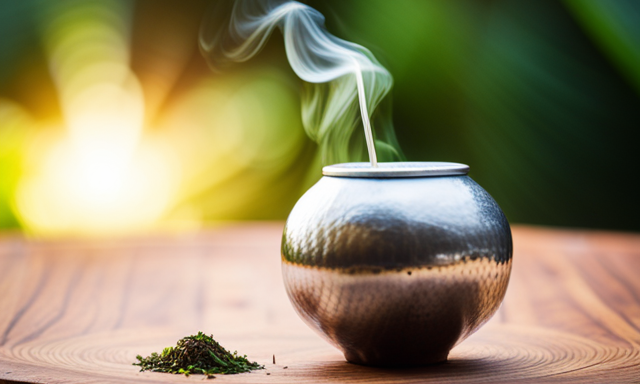
 Yerba Mate2 months ago
Yerba Mate2 months agoHow To Use Yerba Mate Straw
-

 Tea Brewing and Preparation3 months ago
Tea Brewing and Preparation3 months agoThe Science Behind Decaffeinated Tea: Methods And Benefits
-
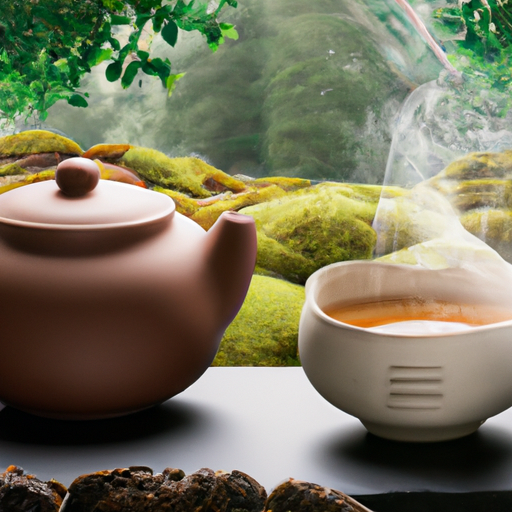
 Tea Brewing and Preparation3 months ago
Tea Brewing and Preparation3 months agoComparing Earl Grey And Green Tea: Benefits And Differences
-

 Tea and Philosophy3 months ago
Tea and Philosophy3 months agoLinkBoss Revolutionizes Interlinking Strategy for WordPress Sites








